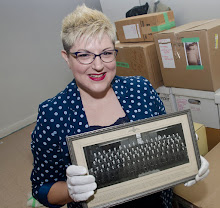I have been neglecting this journal in favour of the much more mindless Live Journal that I can be found frequently posting in. I've been trying to reserve this one for more profound thoughts, but I haven't had many of late.
With the exception of my little theory concerning the grade nine students who come through Eternal Egypt. I have discussed it with various people whom I consider intelligent and thoughtful, including my mother, and mostly once I lay it out, they agree. I came to this understanding after one particular day when I had lots of grade fives and one class of developmentally handicapped adults.
From what I have seen and experienced, the grade nines are the absolute most difficult age level to engage in conversation. They do not want to talk. Sometimes, they raise their hands and then as soon as I turn to them they falter. This is not nearly so bad among the grade elevens, who are beginning to show interest and offer answers. It came to me when I dealt with the developmentally impaired group. These were also young adults, probably around 18 years of age, or so, and yet I had no trouble engaging them. They were a lot like the grade five groups I see so much of with their enthusiasm and volunteering of information.
Children are very emotional. They have no trouble suspending their disbelief. If I tell them that Egyptian judgement consisted of the deceased's heart being weight against a feather, they have no problem accepting that a heart can weigh as little as a feather. Or that the feather of Ma'at (the concept of truth and order) might actually weigh more than a normal feather. Again, with the group of special adults, they had no problem accepting this. They are able to believe, just as a child can believe in Santa Claus or the Tooth Fairy. In contrast, the grade elevens have developed their 'mature' thinking skills. They no longer think of things in terms of emotion, instead they think rationally. They can understand the emotional qualities, but place it in a seperate compartment.
The grade nines, however; are in the process of making the leap from emotional thought to rational understanding. More often than not, their questions are the ones that struggle to bridge the gap. For instance, "How can a heart and feather weigh the same?" They are attempting to reason out the answer, but are unable to quite let go of their child-like comprehension. It's sort of an extension, I think, of how younger children try to comprehend the existence of Santa Claus. Grade nine is a brutal time in a person's development, and now, taking into consideration what I have seen, I think I have a much better understanding of exactly what makes it so difficult. More than any other year in a kid's life, I think that one is the gap over which the youth is standing, one foot in childhood, the other in adulthood.
I wouldn't want to repeat it under any circumstance, but it does make me view them less as a downer and more as a challenge.
A little piece of my mind, for what it's worth
About Me

- MiRSCH
- Museum professional, PhD student, adventurer, cat-mom, day-dreamer. Working hard at all four. Bad at math.
Recent deviations
MiniMeanderings
Some Favourite Reading
- 1984 - Orwell
- Box of Delights, The - Masefield
- Chronicles of Narnia, The - Lewis
- Frankenstein - Shelley
- Good Omens - Pratchett/Gaiman
- Great Expectations - Dickens
- Mirror of the Artist, The - Harbison
- Neuromancer - Gibson
- Phantom Tollbooth, The - Juster
- Tennant of Wildfell Hall, The - Bronte, A.
Blog Archive
- October 2001 (14)
- November 2001 (27)
- December 2001 (16)
- January 2002 (29)
- February 2002 (17)
- March 2002 (18)
- April 2002 (21)
- May 2002 (26)
- June 2002 (16)
- July 2002 (9)
- August 2002 (13)
- September 2002 (12)
- October 2002 (18)
- November 2002 (12)
- December 2002 (13)
- January 2003 (13)
- February 2003 (12)
- March 2003 (13)
- April 2003 (13)
- May 2003 (20)
- June 2003 (9)
- July 2003 (16)
- August 2003 (15)
- September 2003 (15)
- October 2003 (11)
- November 2003 (14)
- December 2003 (14)
- January 2004 (12)
- February 2004 (9)
- March 2004 (8)
- April 2004 (8)
- May 2004 (6)
- June 2004 (8)
- July 2004 (7)
- August 2004 (5)
- September 2004 (7)
- October 2004 (6)
- November 2004 (5)
- December 2004 (10)
- January 2005 (6)
- February 2005 (7)
- March 2005 (6)
- April 2005 (9)
- May 2005 (6)
- June 2005 (6)
- July 2005 (3)
- August 2005 (6)
- September 2005 (3)
- October 2005 (5)
- November 2005 (2)
- December 2005 (7)
- January 2006 (1)
- February 2006 (3)
- March 2006 (6)
- April 2006 (2)
- May 2006 (7)
- June 2006 (3)
- July 2006 (3)
- August 2006 (1)
- September 2006 (3)
- October 2006 (3)
- November 2006 (3)
- December 2006 (2)
- January 2007 (2)
- March 2007 (1)
- April 2007 (1)
- May 2007 (3)
- July 2007 (47)
- August 2007 (3)
- September 2007 (4)
- October 2007 (4)
- June 2008 (2)
- August 2008 (2)
- September 2008 (2)
- November 2008 (1)
- December 2008 (1)
- February 2009 (1)
- March 2009 (2)
- April 2009 (1)
- August 2009 (1)
- March 2010 (1)
- July 2010 (1)
- September 2010 (1)
- November 2010 (1)
- June 2011 (1)
- July 2011 (1)
- September 2011 (1)
- October 2011 (3)
- November 2011 (2)
- July 2012 (1)